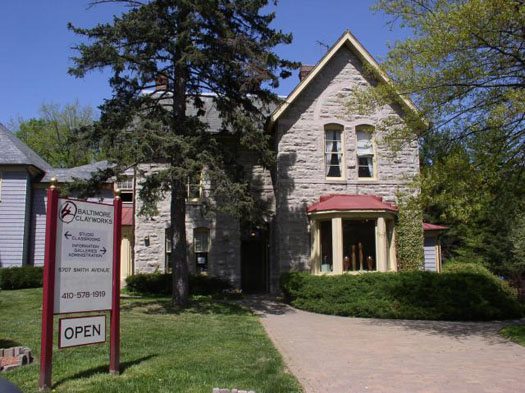
June 20, 2017; Baltimore Sun
In a growing effort to keep the arts nonprofit Baltimore Clayworks present in the city’s Mount Washington neighborhood, Baltimore’s city council approved a resolution last week that urges the Governor of Maryland and the Board of Public Works (BPW) to reject the proposed sale of two of the organization’s downtown properties.
The board and leadership staff have moved forward with plans to sell the expensive historical buildings in which the organization currently resides to move to a less expensive “artist” neighborhood outside of downtown. As news of the potential sale arose, a grassroots movement to keep Clayworks downtown swiftly grew among the organization’s clientele—mainly students, teachers, and artists.
According to a white paper on Clayworks’ website, this movement was led in part by founder and former executive director Deborah Bedwell, who points a finger at new leadership and financial mismanagement over the years since her departure.
Clayworks has an annual budget of $1.2M, but is facing up to a $1.3 million debt, which Kathryn Holt, Clayworks’ board chair, attributes to the loss of donations after the 2008 recession and the subsequent accumulation of negative cash flow years. While the organization’s leadership is aligned on this strategy to relieve potential insolvency through the sale of its real estate, it requires the permission of the BPW in order to execute on it after having accepted $700,000 in state-issued bonds since 2000. And while the stipulations and restrictions of those bonds are unclear, Clayworks would no doubt suffer some compliance consequences by taking action without the approval of BPW.
The resolution passed last week represents the community’s collective voice and provides an assurance that voice will be heard when the BPW makes their decision. City Councilman Isaac “Yitzy” Schleifer, one of the key sponsors of the bill, stated that Clayworks is “a gem for the entire city, state and really the country” and that this sale “would force the closure of this nonprofit.”
Sign up for our free newsletters
Subscribe to NPQ's newsletters to have our top stories delivered directly to your inbox.
By signing up, you agree to our privacy policy and terms of use, and to receive messages from NPQ and our partners.
Clayworks leadership disagrees, pointing to the financial downturn which hit long before Bedwell’s departure in 2012. They see this sale as one of very few ways, if in fact there are any others, to keep the organization running while remaining just a few neighborhoods away. A quick look at their financial picture would certainly support that view, with a nonprofit buyer, Itineris, a Baltimore nonprofit serving adults with autism, already agreeing to pay $3.7 million for the properties.
Devon Powell, Clayworks’ interim executive director, stated, “I only wish that they and our City Council representatives would realize the breadth and depth of our financial situation and the triple win within sight: financial stability for Clayworks; a welcome new nonprofit neighbor for Mount Washington; and a potential boost for the redevelopment of the City’s new arts districts, which our Council also supports,” Powell said.
The whitepaper suggests there seems to be a nasty combination of nonprofit-funder dynamics and “founder syndrome” at work, and significant fallout could come from external stakeholders trying to drive operational decisions they’re not close enough to fully understand. Clayworks’ fiduciary responsibilities, and the decision on whether or not to move forward with this sale, ultimately rests with its board of directors. As Powell stated simply, “The people who want to save Clayworks by stopping its sale are in fact at risk of sealing its doom.”
Readers should remember our newswire from last week about a similar issue visiting a local arts nonprofit in Delaware. This is yet another situation where multiple nodes of governance are affecting the sustainability of a local arts organization.
Baltimore Clayworks’ strategy of trying to transparently clarify its position to stakeholders from its own more intimate perspective is an interesting one, and we will watch to see how things progress.—Danielle Holly













